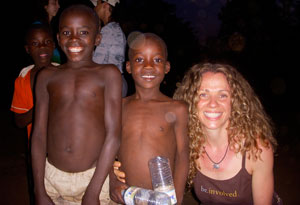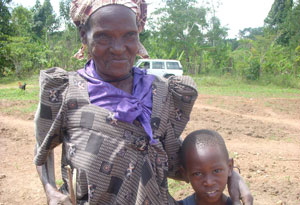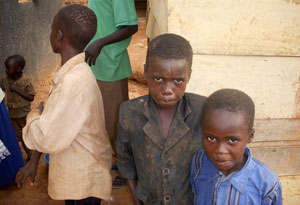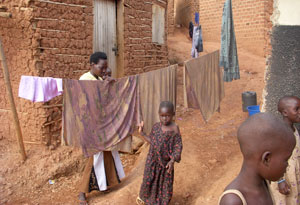A Culture in Trauma

Photo: Seane Corn
A yoga instructor and activist, Seane Corn has made it her mission to bring awareness to the HIV/AIDS crisis. She's sharing her story with us as she blogs from the Uganda Seva Challenge, a trip that will raise money to fund and build health education programs for children in Uganda.
I am in Kasana, a remote village in the bush about an hour away from Kampala, the city we've been staying in over the past few days. It is 6 a.m. and I am lying awake under a mosquito net listening to the sounds of Africa around me. In the distance I can hear a man chanting loudly to the rhythm of a drum. Ba-bup, ba-bup, like a heartbeat, as the man wails in a deep, earthy baritone, praying, I assume, in gratitude and devotion to God. Other than that, all is quiet except for the rising birds, calling back and forth to each other from the acacia and palm trees. Around me are the early morning smells of petrol and cooked plantains.It has been an amazing few days. The women who have come with us are all very diverse and interesting, and I'm looking forward to working with them and learning more about what inspired them to raise the money to get here. Our daily itinerary is full, and I expect that they will be both thrilled and challenged by this experience. Every morning, before we go to work, we will practice yoga and set our intentions. For this experience to be sustainable and deeply meaningful, it is essential that we spend time every day connecting to our bodies, breath, each other and God. By invoking the sacred, we can be reminded of what our purpose here is, beyond the obvious, which is the service work we'll do in the field. Through grace, we can remember that we are all connected, all one, and are here dignify the human experience, as it is, with love. Not with judgment or pity, which only perpetuates separation, but with understanding and empathy, qualities that unite. Yoga helps us to maintain this perspective in body, mind and spirit and gives us the tools we need to remain open. We can remember that is it our dharma, and privilege, to serve someone else's karma and move forward, willingly and lovingly, in that service.
Most evenings, we will gather together for "processing." This will give the women an opportunity to share their feelings, identify their fears, resistances and assumptions and cultivate skills they can call upon so as to stay absolutely conscious and present throughout these next two weeks. This will include sitting in a circle and checking in, participating in diversity rituals, journal writing, dyads and group sharing. It is necessary to include diversity practices because, for the second time in a row, all the women who have managed to raise the money and earn a spot on this trip are white. This includes Suzanne (my co-facilitator) and I. The only person of color is Nikki, who is our assistant on this trip and a strong voice for cultural awareness.
It is critical for all of us to explore perceptions, assumptions, prejudices, elitism, understand racial and class division and exclusion and be conscious of not projecting our experience, traditions or heritage onto the people of this or any culture. In service or outreach, there is often a desire to "fix" someone or a situation. To interfere without truly understanding the ways in which a culture operates, and respect how it defines and supports itself no matter the socio-economic-political circumstance, is arrogant and presumptuous. Which, by the way, I've certainly been guilty of being. Over the years, I have learned that when I come to serve, I need to understand, respect and work within the culture I'm serving and not impose my beliefs, customs, politics or comforts, unless invited to do so.
How the group is handling the journey

Photo: Seane Corn
Suzanne and I have also found in the past that if people aren't accustomed to working in impoverished environments where trauma, abuse and neglect are often present, their own "stuff" can come up. This means their own trauma or fears can be triggered and they can become reactive or hypersensitive as a result. If we don't acknowledge this probability, and they don't deal with their emotions, very often reactions like burnout, judgment or shutdown will occur. Sometimes this can look like isolating, over or undereating, picking arguments, watching TV, gossiping, acting out sexually, drinking or using drugs and/or spending too much time on the computer. We look at the habits they may use to numb or anesthetize their big, although unidentified, feelings.
For service to truly be sustainable, the participants must be willing to self-reflect and look inward as honestly as possible. So we do yoga, pray, meet, share and provide different skills to acknowledge and process the feelings as they come up. This has proven to allow all of us to remain more open and available to each other and the populations we've come to serve. This part of the journey is exceptionally important, but for some it probably will be the most challenging. We will ask them to commit to owning their feelings, speaking their truths and serving their spirits with as much enthusiasm and fearlessness as they are willing to serve others. You can't change the world unless you're willing to change yourself!
On a personal level, I'm still struggling with laryngitis, but I have managed to keep it in perspective. It is a nuisance, but I take comfort in the absolute knowing that it will be gone shortly and soon forgotten. I think about the men and women I've seen over the years lying on the floors of their huts or slums, dying miserably of the very curable tuberculosis. Because of poverty, they don't have access to the drugs that are available to us and, as a secondary infection to HIV/AIDS, their immune systems can't fight the infection and they will likely die. I hear them in my mind coughing and struggling to speak, and I put quickly in check any inconvenience I'm feeling over my own lost voice and cough and remain grateful.
We've spent the past few days in the company of various nongovernmental organizations (NGOs) learning about Uganda; it's politics and culture. It is important to Suzanne and I that the participants understand a little about the Ugandan history so that they can appreciate why some people are living and acting they way they do. War, violence and displacement are traumatic circumstances that effect each generation of people, especially when there are not enough services available that aid in the natural response to trauma, like fear, low self-esteem and grief. When trauma is not processed and remains repressed, domestic violence, drug and alcohol abuse and depression are side effects that affect not only the individual, but also their family and community as well. It can define a culture for generations.
Uganda is a culture in trauma, having only known uncertain peace over the past few years. Since the early 1980s, Northern Uganda has known civil unrest resulting in the estimated death toll of well over 200,000 people, the displacement of over 2 million and the abduction of thousands of children forced to fight. Just prior, the Ugandan suffered at the hands of dictator Edi Amin and a reign that also amounted in thousands of deaths and cultural terror. Both these conflicts have resulted in genocide, rape, political persecution, individual disempowerment and a breakdown of Uganda's rich tribal culture.
Why the children in Uganda are suffering
For service to truly be sustainable, the participants must be willing to self-reflect and look inward as honestly as possible. So we do yoga, pray, meet, share and provide different skills to acknowledge and process the feelings as they come up. This has proven to allow all of us to remain more open and available to each other and the populations we've come to serve. This part of the journey is exceptionally important, but for some it probably will be the most challenging. We will ask them to commit to owning their feelings, speaking their truths and serving their spirits with as much enthusiasm and fearlessness as they are willing to serve others. You can't change the world unless you're willing to change yourself!
On a personal level, I'm still struggling with laryngitis, but I have managed to keep it in perspective. It is a nuisance, but I take comfort in the absolute knowing that it will be gone shortly and soon forgotten. I think about the men and women I've seen over the years lying on the floors of their huts or slums, dying miserably of the very curable tuberculosis. Because of poverty, they don't have access to the drugs that are available to us and, as a secondary infection to HIV/AIDS, their immune systems can't fight the infection and they will likely die. I hear them in my mind coughing and struggling to speak, and I put quickly in check any inconvenience I'm feeling over my own lost voice and cough and remain grateful.
We've spent the past few days in the company of various nongovernmental organizations (NGOs) learning about Uganda; it's politics and culture. It is important to Suzanne and I that the participants understand a little about the Ugandan history so that they can appreciate why some people are living and acting they way they do. War, violence and displacement are traumatic circumstances that effect each generation of people, especially when there are not enough services available that aid in the natural response to trauma, like fear, low self-esteem and grief. When trauma is not processed and remains repressed, domestic violence, drug and alcohol abuse and depression are side effects that affect not only the individual, but also their family and community as well. It can define a culture for generations.
Uganda is a culture in trauma, having only known uncertain peace over the past few years. Since the early 1980s, Northern Uganda has known civil unrest resulting in the estimated death toll of well over 200,000 people, the displacement of over 2 million and the abduction of thousands of children forced to fight. Just prior, the Ugandan suffered at the hands of dictator Edi Amin and a reign that also amounted in thousands of deaths and cultural terror. Both these conflicts have resulted in genocide, rape, political persecution, individual disempowerment and a breakdown of Uganda's rich tribal culture.
Why the children in Uganda are suffering

Photo: Seane Corn
We met with Invisible Children (InvisibleChildren.org), and they spoke to us about the conflict in Northern Uganda and the Lord's Resistance Army (LRA). We learned about the over 45,000 children who walk each night from their villages to the larger towns, sleeping en masse in bus stations and parks. They do this to avoid the nighttime raids meant to abduct children, often as young as 5, and force them into becoming soldiers. We heard testimonials from parents and siblings about how their own family members were stolen from their homes, made to join rebel armies, first starved, often made addicted to drugs, raped and then forced to murder.
Sometimes these children escaped the LRA only to return to their villages traumatized, pregnant and lost. Most often they stay, too addicted, brainwashed or ashamed to return home once having been forced to commit atrocities like murder. Many families have been torn apart, surviving in refugee camps, far from their villages, without available food or water. We will visit one of these refugee slums, called the Acholi Quarter, and meet the men, women and children who live there.
We also met with Pace, a partner organization with YouthAIDS (YouthAIDS.org), and learned about the HIV/AIDS crisis in Uganda and how this international emergency is affecting its people. HIV/AIDS, a global pandemic that is most evident throughout sub-Saharan Africa, has infected over 1 million people here in Uganda, creating over 1.2 million orphans as a result. Sixty-five percent of the people in rural areas are infected and most, because of lack of information and fear, don't even know they have it or are unwilling to be tested for fear of stigma and being ostracized. It is not uncommon for grandmothers to be raising their many grandchildren because their own children have died from this devastating, although preventable, disease.
It was exciting to go over to Pace's office and learn more about what they were doing to continue to raise awareness and improve the health of vulnerable Ugandans. They introduced us to their various programs of education and prevention, including care packages they make that are distributed to thousands of people with HIV. These packages include a safe drinking water system, mosquito nets, condoms and antibiotics. When used correctly, they prevent secondary infections like TB, malaria and other opportunistic infections that can seriously weaken their already compromised health, resulting in death.
Another program they shared with us was the Go Getter's Club, which uses peer groups trained to target college-age girls with positive, empowering and lifesaving information about safe sex and HIV/AIDS. These young girls are at risk because of "sugar daddies," older men who seduce or intimidate them with gifts, money or promises in exchange for sex. Multigenerational sex is a huge issue in Uganda, and Pace is committed to using the media to de-romanticize these affairs, instead creating a stigma against the men who desire and seek out such relationships. These men are usually married and often exploit multiple young women simultaneously, all running the risk of infection as a result. Off the Mat (OTM) has contributed a portion of the money we raised to support the Go Getter's Club in their effort to empower and educate young women.
Why childbirth is a dirty business in Uganda
Sometimes these children escaped the LRA only to return to their villages traumatized, pregnant and lost. Most often they stay, too addicted, brainwashed or ashamed to return home once having been forced to commit atrocities like murder. Many families have been torn apart, surviving in refugee camps, far from their villages, without available food or water. We will visit one of these refugee slums, called the Acholi Quarter, and meet the men, women and children who live there.
We also met with Pace, a partner organization with YouthAIDS (YouthAIDS.org), and learned about the HIV/AIDS crisis in Uganda and how this international emergency is affecting its people. HIV/AIDS, a global pandemic that is most evident throughout sub-Saharan Africa, has infected over 1 million people here in Uganda, creating over 1.2 million orphans as a result. Sixty-five percent of the people in rural areas are infected and most, because of lack of information and fear, don't even know they have it or are unwilling to be tested for fear of stigma and being ostracized. It is not uncommon for grandmothers to be raising their many grandchildren because their own children have died from this devastating, although preventable, disease.
It was exciting to go over to Pace's office and learn more about what they were doing to continue to raise awareness and improve the health of vulnerable Ugandans. They introduced us to their various programs of education and prevention, including care packages they make that are distributed to thousands of people with HIV. These packages include a safe drinking water system, mosquito nets, condoms and antibiotics. When used correctly, they prevent secondary infections like TB, malaria and other opportunistic infections that can seriously weaken their already compromised health, resulting in death.
Another program they shared with us was the Go Getter's Club, which uses peer groups trained to target college-age girls with positive, empowering and lifesaving information about safe sex and HIV/AIDS. These young girls are at risk because of "sugar daddies," older men who seduce or intimidate them with gifts, money or promises in exchange for sex. Multigenerational sex is a huge issue in Uganda, and Pace is committed to using the media to de-romanticize these affairs, instead creating a stigma against the men who desire and seek out such relationships. These men are usually married and often exploit multiple young women simultaneously, all running the risk of infection as a result. Off the Mat (OTM) has contributed a portion of the money we raised to support the Go Getter's Club in their effort to empower and educate young women.
Why childbirth is a dirty business in Uganda

Photo: Seane Corn
Although there is so much beauty and vibrancy among the people, you can also sense the despair that poverty and hunger brings, especially in its men. On our very first day, we visited the Acholi slums, bringing food, medical supplies and clothing to the people who live there. The participants were surprised to notice that the women seem to be the ones working and raising the children, while the men gather in makeshift bars and spend what money they earn on alcohol. Many of them were understandably distressed and angered to see this, which I can understand, but it is very easy to be judgmental. I often think if perhaps I didn't have the tools or support to deal with my deep pain, loss and grief...I'd drink too.
Yesterday we drove into Kasana to meet with Natalie Angell who runs Shanti Uganda, another of the organizations we are funding. We've come to help her build an eco-birthing center deep in the bush.
Giving birth in Uganda is a dangerous and dirty business. The clinics where the impoverished can afford to give birth are so awful, unclean and ill equipped that many women would rather take the chance and birth at home, even though they may not have the proper or sanitary instruments necessary to guarantee a healthy and safe delivery. As a result, both infant and mother mortality are heartbreakingly high because of infection and lack of proper care. Lost is the art of birthing in a sacred and compassionate way and often the mothers are left alone, in their pain and without support, only to be treated indifferently and harshly during the birth itself. Many women are even hit by their midwives if they cry out or scream. Also, because of high instances of untreated malaria, mothers often miscarry in the second trimester. Caesareans are practiced with unnecessary frequency, abortions are primitive, and often mother's with HIV/AIDS aren't given the drugs available to prevent mother to child transmission at the time of delivery. All too commonly, the disease is passed to the child through her breast milk as a result. Natalie's description of the standard birthing practice sounded barbaric and frightening, and I couldn't imagine what giving birth for the Ugandan poor must be like.
I was soon about to find out...
Seane Corn is an internationally celebrated yoga teacher known for her impassioned activism, unique self-expression and inspirational style of teaching that incorporates both the physical and mystical aspects of the practice of yoga. For more on Seane Corn, visit SeaneCorn.com.
Yesterday we drove into Kasana to meet with Natalie Angell who runs Shanti Uganda, another of the organizations we are funding. We've come to help her build an eco-birthing center deep in the bush.
Giving birth in Uganda is a dangerous and dirty business. The clinics where the impoverished can afford to give birth are so awful, unclean and ill equipped that many women would rather take the chance and birth at home, even though they may not have the proper or sanitary instruments necessary to guarantee a healthy and safe delivery. As a result, both infant and mother mortality are heartbreakingly high because of infection and lack of proper care. Lost is the art of birthing in a sacred and compassionate way and often the mothers are left alone, in their pain and without support, only to be treated indifferently and harshly during the birth itself. Many women are even hit by their midwives if they cry out or scream. Also, because of high instances of untreated malaria, mothers often miscarry in the second trimester. Caesareans are practiced with unnecessary frequency, abortions are primitive, and often mother's with HIV/AIDS aren't given the drugs available to prevent mother to child transmission at the time of delivery. All too commonly, the disease is passed to the child through her breast milk as a result. Natalie's description of the standard birthing practice sounded barbaric and frightening, and I couldn't imagine what giving birth for the Ugandan poor must be like.
I was soon about to find out...
Seane Corn is an internationally celebrated yoga teacher known for her impassioned activism, unique self-expression and inspirational style of teaching that incorporates both the physical and mystical aspects of the practice of yoga. For more on Seane Corn, visit SeaneCorn.com.
The opinions expressed by Oprah.com contributors are strictly their own.



